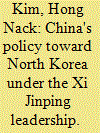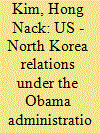|
|
|
Sort Order |
|
|
|
Items / Page
|
|
|
|
|
|
|
| Srl | Item |
| 1 |
ID:
124587


|
|
|
|
|
| Publication |
2013.
|
| Summary/Abstract |
Purpose-The purpose of this article is to examine China's policy toward North Korea under the Xi Jinping leadership from 2012 to the present.
Design/methodology/approach-It is designed to analyze China's changing attitudes and policy toward North Korea in the post-Kim Jong-Il era with emphasis on the analysis of the Xi Jinping leadership's policy toward the Kim Jong-Un regime. The approach is qualitative and expository, utilizing Chinese, Japanese, Korean and English source materials.
Findings-Unlike its predecessor, which regarded the prevention of the collapse of the North Korean regime as the top priority of China's Korea policy, the Xi Jinping leadership regards the preservation of peace and stability on the Korean Peninsula as the top priority of its Korea policy, for the outbreak of a war on the Korean Peninsula could seriously undermine China's security interest by embroiling it in an unwanted war. Unlike its predecessors, the Xi leadership is serious about the elimination of North Korea's nuclear weapons program.
Originality/value-The value of the article lies in its explanation for the change in the priority of China's policy from the survival of the North Korean regime to the preservation of peace and stability on the Korean Peninsula. In addition, it helps to explain why China under the Xi Jinping leadership has become not only more serious about opposing Pyongyang's nuclear weapons program but also more cooperative with the U.S. and other powers for the denuclearization of North Korea.
|
|
|
|
|
|
|
|
|
|
|
|
|
|
|
|
| 2 |
ID:
081305


|
|
|
|
|
| Publication |
2008.
|
| Summary/Abstract |
In the summer of 2007, North Korea's decision to abandon its nuclear weapons program in accordance with the September 19 joint statement (2005) and the February 13 agreement (2007) aroused hopes that the denuclearization of the Korean Peninsula would at last become a reality. Such an expectation was strengthened by North Korea's actual suspension of the operation of its Yongbyon nuclear facilities in July 2007 and also by its commitment to disable these facilities by the end of 2007. The breakthrough in the denuclearization of North Korea has been possible as a result of concerted diplomatic efforts on the part of the powers involved in a series of the six-party talks in Beijing from 2003 to 2007.
As a part of the overall settlement of the North Korean nuclear issue, the six powers have pledged in these agreements to bring about diplomatic normalization between Japan and North Korea on the basis of the Pyongyang Declaration of 2002. Thus, the normalization of Japanese-North Korean relations is no longer a bilateral issue for Tokyo and Pyongyang, but also an important matter of concern for major powers in the region, nations which have signed the agreements of 2005 and 2007 at the six-party talks in Beijing.
This article examines Japanese-North Korean relations with an emphasis on the analysis of major issues involved in this bilateral relationship. Since we have already published papers analyzing Japanese-North Korean relations preceding the 2004 Pyongyang summit elsewhere,1 our focus of this paper will be on the post-2004 developments in Tokyo-Pyongyang relations. As will be shown, the inability of the two neighboring countries to normalize diplomatic relations so far can be ascribed largely to Pyongyang's unwillingness to abandon its nuclear weapons program and, to a lesser degree, to its clumsy handling of the abduction issue and to Japan's inflexibility and unwillingness to compromise on the abduction issue. Now that Pyongyang has agreed to abandon its nuclear weapons program, the question remains as to whether or not the two neighboring countries can settle the abduction issue and normalize diplomatic relations when Pyongyang disables its nuclear facilities.
|
|
|
|
|
|
|
|
|
|
|
|
|
|
|
|
| 3 |
ID:
066471


|
|
|
|
|
| Publication |
New York, M. E. Sharpe, 2005.
|
| Description |
xi, 322p.
|
| Standard Number |
0765616386
|
|
|
|
|
|
|
|
|
|
|
|
Copies: C:1/I:0,R:0,Q:0
Circulation
| Accession# | Call# | Current Location | Status | Policy | Location |
| 050306 | 320.95193/KIH 050306 | Main | On Shelf | General | |
|
|
|
|
| 4 |
ID:
095755


|
|
|
|
|
| Publication |
2010.
|
| Summary/Abstract |
North Korea's nuclear weapons program has been a major headache for the U. S. throughout the post-Cold War era. Pyongyang's attempt to develop nuclear weapons got the nation into serious problems with both the Clinton administration (1993-2001) and the Bush administration (2001-2009), as both U. S. administrations maintained that the nonproliferation of nuclear weapons was essential for the preservation of the existing international order. Although the U. S. succeeded in persuading North Korea to give up its nuclear weapons program through the six-party talks by September 2005 (i.e., the September 19 Joint Statement), Pyongyang did not fulfill its commitment on denuclearization by the end of 2008. As a result, the Obama administration has inherited the unfinished task of implementing the agreement on North Korea's denuclearization.
The purpose of this paper is to examine U. S.-North Korean relations during the early phase of the Obama administration with emphasis on the analysis of the administration's handling of the North Korean denuclearization issue from the time of its inauguration in January 2009 to the present. Like his predecessors, President Obama is determined to bring about the denuclearization of North Korea, because the proliferation of nuclear weapons by a rogue nation such as North Korea could not only pose serious threats to the U. S. but also spell the end of the nuclear nonproliferation regime. Unless North Korea returns to the Six-Party Talks for denuclearization, the U. S. will not relax sanctions against Pyongyang.
|
|
|
|
|
|
|
|
|
|
|
|
|
|
|
|
|
|
|
|
|